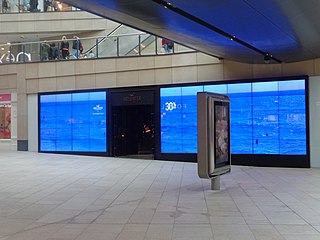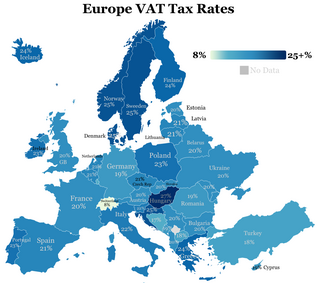Related Research Articles

Sales are activities related to selling or the number of goods sold in a given targeted time period. The delivery of a service for a cost is also considered a sale. A period during which goods are sold for a reduced price may also be referred to as a "sale".
In law, conveyancing is the transfer of legal title of real property from one person to another, or the granting of an encumbrance such as a mortgage or a lien. A typical conveyancing transaction has two major phases: the exchange of contracts and completion.
Caveat emptor is Latin for "Let the buyer beware". It has become a proverb in English. Generally, caveat emptor is the contract law principle that controls the sale of real property after the date of closing, but may also apply to sales of other goods. The phrase caveat emptor and its use as a disclaimer of warranties arises from the fact that buyers typically have less information than the seller about the good or service they are purchasing. This quality of the situation is known as 'information asymmetry'. Defects in the good or service may be hidden from the buyer, and only known to the seller.

A timeshare is a property with a divided form of ownership or use rights. These properties are typically resort condominium units, in which multiple parties hold rights to use the property, and each owner of the same accommodation is allotted their period of time. Units may be sold as a partial ownership, lease, or "right to use", in which case the latter holds no claim to ownership of the property. The ownership of timeshare programs is varied, and has been changing over the decades.
A hire purchase (HP), also known as an installment plan, is an arrangement whereby a customer agrees to a contract to acquire an asset by paying an initial installment and repaying the balance of the price of the asset plus interest over a period of time. Other analogous practices are described as closed-end leasing or rent to own.
In law, a warranty is an expressed or implied promise or assurance of some kind. The term's meaning varies across legal subjects. In property law, it refers to a covenant by the grantor of a deed. In insurance law, it refers to a promise by the purchaser of an insurance about the thing or person to be insured.

Online shopping is a form of electronic commerce which allows consumers to directly buy goods or services from a seller over the Internet using a web browser or a mobile app. Consumers find a product of interest by visiting the website of the retailer directly or by searching among alternative vendors using a shopping search engine, which displays the same product's availability and pricing at different e-retailers. As of 2020, customers can shop online using a range of different computers and devices, including desktop computers, laptops, tablet computers and smartphones.

A receipt is a document acknowledging that a person has received money or property in payment following a sale or other transfer of goods or provision of a service. All receipts must have the date of purchase on them. If the recipient of the payment is legally required to collect sales tax or VAT from the customer, the amount would be added to the receipt, and the collection would be deemed to have been on behalf of the relevant tax authority. In many countries, a retailer is required to include the sales tax or VAT in the displayed price of goods sold, from which the tax amount would be calculated at the point of sale and remitted to the tax authorities in due course. Similarly, amounts may be deducted from amounts payable, as in the case of taxes withheld from wages. On the other hand, tips or other gratuities that are given by a customer, for example in a restaurant, would not form part of the payment amount or appear on the receipt.
In Economics and Law, exclusive dealing arises when a supplier entails the buyer by placing limitations on the rights of the buyer to choose what, who and where they deal. This is against the law in most countries which include the USA, Australia and Europe when it has a significant impact of substantially lessening the competition in an industry. When the sales outlets are owned by the supplier, exclusive dealing is because of vertical integration, where the outlets are independent exclusive dealing is illegal due to the Restrictive Trade Practices Act, however, if it is registered and approved it is allowed. While primarily those agreements imposed by sellers are concerned with the comprehensive literature on exclusive dealing, some exclusive dealing arrangements are imposed by buyers instead of sellers.
Lemon laws are laws that provide a remedy for purchasers of cars and other consumer goods in order to compensate for products that repeatedly fail to meet standards of quality and performance. Although many types of products can be defective, the term "lemon" is mostly used to describe defective motor vehicles, such as cars, trucks, and motorcycles.
A pre-order is an order placed for an item that has not yet been released. The idea for pre-orders came because people found it hard to get popular items in stores because of their popularity. Companies then had the idea to allow customers to reserve their personal copy before its release, which has been a huge success.

Tax-free shopping (TFS) is the buying of goods in another country or state and obtaining a refund of the sales tax which has been collected by the retailer on those goods. The sales tax may be variously described as a sales tax, goods and services tax (GST), value added tax (VAT), or consumption tax.

The Consumer Protection Regulations 2000, SI 2000/2334, implements European Directive 97/7/EC as UK law. They apply to contracts "concluded between a supplier and a consumer under an organised distance sales or services provision scheme run by the supplier who, for the purposes of the contract, makes use of one or more means of distance communication" up to and including the moment the contract is agreed. The legislation provides rights to the consumer and obligations which the seller must fulfill.

The European Union value-added tax is a value added tax on goods and services within the European Union (EU). The EU's institutions do not collect the tax, but EU member states are each required to adopt in national legislation a value added tax that complies with the EU VAT code. Different rates of VAT apply in different EU member states, ranging from 17% in Luxembourg to 27% in Hungary. The total VAT collected by member states is used as part of the calculation to determine what each state contributes to the EU's budget.
Consumer protection is the practice of safeguarding buyers of goods and services, and the public, against unfair practices in the marketplace. Consumer protection measures are often established by law. Such laws are intended to prevent businesses from engaging in fraud or specified unfair practices to gain an advantage over competitors or to mislead consumers. They may also provide additional protection for the general public which may be impacted by a product even when they are not the direct purchaser or consumer of that product. For example, government regulations may require businesses to disclose detailed information about their products—particularly in areas where public health or safety is an issue, such as with food or automobiles.

In retail, a product return is the process of a customer taking previously purchased merchandise back to the retailer, and in turn receiving a refund in the original form of payment, exchange.
Non-store retailing is the selling of goods and services outside the confines of a retail facility. It is a generic term describing retailing taking place outside of shops and stores. The non-store distribution channel can be divided into direct selling and distance selling, the latter including all forms of electronic commerce. Distance selling includes mail order, catalogue sales, telephone solicitations and automated vending. Electronic commerce includes online shopping, internet trading platforms, travel portals, global distribution systems and teleshopping. Direct selling includes party sales and all forms of selling in consumers' homes and offices, including even garage sales.

Omnichannel retail strategy, originally also known in the U.K. as bricks and clicks, is a business model by which a company integrates both offline (bricks) and online (clicks) presences, sometimes with the third extra flips.
The Consumer Rights Directive 2011/83/EU is a consumer protection measure in EU law. It was due to be implemented by 13 December 2013.

The Consumer Rights Act 2015 is an act of Parliament of the United Kingdom which consolidates existing consumer protection law legislation and also gives consumers a number of new rights and remedies. Provisions for secondary ticketing and lettings came into force on 27 May 2015, and provisions for alternative dispute resolution (ADR) came into force on 9 July 2015 as per the EU Directive on consumer ADR. Most other provisions came into force on 1 October 2015.
References
- ↑ Martha Coakley. "Cooling-Off Periods, Right to Cancel a Sale". Attorney General of Massachusetts. Retrieved 2013-10-08.
- ↑ "Consumer Transactions With Statutory Contract Cancellation Rights". California Department of Consumer Affairs. State of California. Retrieved 19 February 2019.
- ↑ "Guarantees and returns". Your Europe. European Union. 7 March 2018. Retrieved 16 March 2018.
- ↑ Collins, Kelvin (4 December 2017). "Refunds and Exchanges: What to Know Before You Go Shopping". Better Business Bureau. Retrieved 16 March 2018.
- ↑ "Consumer Rights: 10 ways the new EU Consumer Rights Directive will give people stronger rights when they shop online". European Commission. 2011-06-23. Retrieved 2013-10-08.
- ↑ Oechssler, Jörg; Roider, Andreas; Schmitz, Patrick W. (2015). "Cooling Off in Negotiations: Does it Work?". Journal of Institutional and Theoretical Economics. 171 (4): 565–588. CiteSeerX 10.1.1.333.5336 . doi:10.1628/093245615x14307212950056. ISSN 0932-4569. S2CID 14646404.